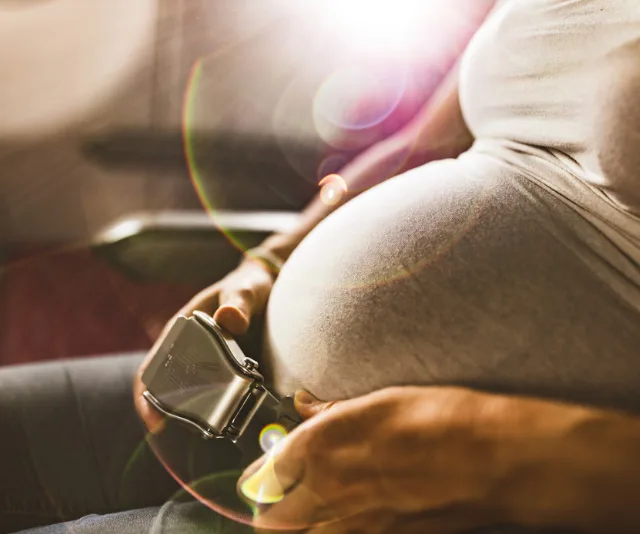By Michelle Legge, Travel with Kit
If you’re thinking of taking a holiday overseas while pregnant, you’re not alone. One in five mums are squeezing in one last holiday in their third trimester before their bundle of joy arrives, according to research by finder.com.au.
The study found that younger mothers are more likely to make the trip, with almost a quarter of mums under 30 enjoying a getaway while pregnant, compared to 16 percent of those aged over 40.
Unsurprisingly, most mums are looking to stay closer to home that late in their pregnancy, and are about three times as likely to travel domestically rather than overseas. But that doesn’t stop five percent of expecting mums from jetting off overseas, even while heavily pregnant.
But is it safe and what else should we be considering? You’ll find everything you need to know below …
Airline policies on flying while pregnant
The World Health Organization (WHO) advises against air travel for pregnant women after the 36th week of pregnancy or four weeks before the expected date of childbirth. Since labour can begin at any time during the last few weeks, it is recommended to avoid travelling during this period.
Instead, WHO recommends that the safest time for expecting mums to travel is in the second trimester.
It’s important for you to know any airline restrictions placed on pregnant travellers before you book your trip. Restrictions around flying while pregnant vary from airline to airline, and also according to the length of the flight.
Both Qantas and Virgin Australia for example, allow women without pregnancy complications to travel on flights more than four hours in length up to the end of the 36th week for single pregnancies and the end of the 32nd week for twins or more.
For flights less than four hours, you can travel up to the end of the 40th week in a single pregnancy and the 36th week for a multiple pregnancy.
But both airlines require women travelling after 28 weeks of pregnancy to carry a note from their doctor or midwife confirming their due date and pregnancy details. For Virgin Australia travellers, this letter needs to be dated no more than 10 days before travel.
And if you have complications, you have to travel with a medical clearance form signed by your doctor.

It’s important to know your airline’s policies for how pregnant you are when you leave, as well as for how pregnant you are when you plan on returning.
(Image: Getty)Travel Insurance while pregnant
Typically, travel insurance offers cover for emergency medical treatment while travelling, and this extends to medical emergencies pregnant women might experience. So if you’re pregnant, and you fall sick, or break a leg, and these events are in no way related to your pregnancy, you’ll be able to claim the hospital trip.
It’s really important to know that cover is provided to you, but not provided for childbirth or the health of a newborn child. When a medical emergency is pregnancy related – let’s say you need help with debilitating nausea – your ability to claim is going to largely depend on three questions – your due date, our doctor’s approval, and whether or not your emergency relates to fertility treatment, triplets and known complications.
For example: Travel with Kit looks after expecting mums with two levels of cover. First they’ll look at the benefits offered under standard cover, and then they’ll explore an optional extra for pregnancy – their Pregnancy Pack.
WATCH: How to save your baby’s life by Bounty. Continues after video …
The main health risks of flying while pregnant
Deep vein thrombosis, or DVT, is the main health concern for pregnant women on planes.
This is when a blood clot forms in a deep vein of the leg, which can cause complications such as pain, inflammation and swelling. The greater danger with these clots is that they can dislodge and travel through the circulatory system, blocking blood supply to the lungs.
The risk of DVT is higher when pregnant and being immobile for long periods is also a risk factor, so it’s worth keeping in mind for any sort of travel, including long car trips.
To reduce your risk keep well hydrated, make sure you’re well mobilised during the flight and wear compression stockings.
Choose the best seat
If you’re travelling by airplane while pregnant, try to get a spot on the aisle so you can get up and stretch your legs.

You’re going to be getting in and out of your seat a lot, so choose wisely.
(Image: Getty Images)What happens if you need to give birth overseas?
If you are travelling in your third trimester or you unexpectedly go into labour overseas there are a few things to consider. Citizenship rules change from country to country, so it’s a good idea to understand the local laws before travelling.
If you are an Australian citizen and you give birth overseas, you’ll need to apply for your child’s Australian citizenship and passport before you can return home.
For application forms and more information visit the Department of Immigration and Border Protection website.
Become a Bounty Parent and be rewarded for your opinions. JOIN HERE
Travel vaccinations for pregnant women
As a pregnant woman, you are at risk of serious complications if you contract malaria or viral hepatitis E. Certain standard vaccinations can also be harmful to your baby when you’re pregnant.
We recommend you get in touch with your doc before you travel to ensure you have the right vaccinations for your trip. Nothing is more important than protecting the health of you and your baby.
Check to see the list of vaccines recommended by the Australian Department of Health.

Get in touch with your doc before you travel to ensure you have the right vaccinations.
(Image: Getty)Source a local OBGYN
Try not to worry in advance, but be prepared for any kind of pregnancy complication by obtaining the name and number of a local OBGYN. You’ll have peace of mind just knowing you can call someone if you have a concern.
Take it slow
A babymoon probably isn’t the time for mountain biking or other strenuous physical activity. Be smart by pacing yourself and building in lots of downtime to nap and read.
The importance of the right type of accommodation
You’ll want to make sure that wherever you pick, you have access to:
A large comfy bed with extra pillows
Healthy menu options
Quality, hygienic food service setup
Day spa with staff trained in antenatal massage and therapies
A nearby hospital or doctors

Before booking your accommodation, make sure they have the right facilities for you in your pregnant state.
(Image: Getty)A pregnancy travel checklist
It’s good to be well prepared for an upcoming journey. It’s even more important when you’re pregnant, with more to consider for you and your unborn baby. Check these steps before you jet off.
Research: Check the airline restrictions for flying while pregnant
Register with Smartraveller: Let the Government know where you’re going, so they can contact you in an emergency.
Visit your GP or OB/GYN: Discuss your travel plans and get the relevant vaccinations. You will most likely need a medical certificate confirming you’re fit to travel.
Research your destination: Consider the foods, cultures and climates of the places your visiting. Know what to avoid, particularly while pregnant.
Pack correctly: Pack clothes that take your changing shape into account and keep you comfortable.




